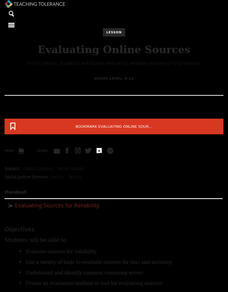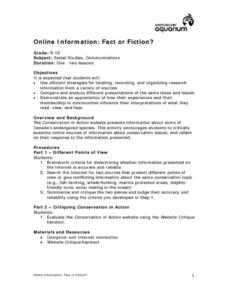Teaching Tolerance
Understanding and Evaluating Online Searches
With billions of options to choose from, how can people determine which online sources are reliable? Using an informative resource, pupils first discuss and evaluate a sample search result handout. Next, partners create a checklist for...
Teaching Tolerance
Evaluating Online Sources
Newspapers, television, social media ... how do people get their news? Using the informative resource, scholars locate and verify credible sources of information. Working in small groups, they discuss strategies for evaluating the...
Curated OER
Online Information: Fact or Fiction
Discuss ways to determine if the information middle and high schoolers gather online is accurate. Using the Internet, they cite two sources that show conflicting points of view on a subtopic of conservation. They summarize and analyze...
Southern Poverty Law Center
Evaluating Online Sources
All sources are pretty much the same, right? If this is how your class views the sources they use for writing or research projects, present them with a media literacy lesson on smart source evaluation. Groups examine several articles,...
Facebook
Online Presence
What happens when an online post gets the wrong kind of attention? Learners evaluate the good, the bad, and the occasionally ugly side of social media posting with a instructional activity from a vast digital citizenship series. After...
California Department of Education
Evaluating Web Sites
If it's on the Internet, it must be true—right? How can someone tell if a website contains less-than-truthful information? Savvy surfers evaluate sources in the fifth of a six-part college and career readiness instructional activity...
PwC Financial Literacy
Evaluating Financial Information
Advertising is all around us. Sometimes those advertisements are directed at young people, so it's important for youngsters to recognize false advertising and fraud when they see it. That's what this instructional activity is all about....
University of Washington
Connecting Youth to Quality Health Information
Many teenagers don't have adequate access to health and nutrition information beyond a quick Internet search. Guide them into health advocacy and proficiency with a lesson focused on MedlinePlus as a reliable source for health...
Teaching Tolerance
Understanding Online Searches
Discover what's behind an online search. Scholars read a handout and engage in discussions to learn how to critically evaluate online search results. Then, working in small groups, they create posters listing their demands for search...
Curated OER
Evaluating Information Sources Worksheet
Your class is getting ready for its first big research project. While they know how to use the Internet, do they know how to find academic information? Do they know how to find credible sources? Give them this packet and bring them to...
Curated OER
Evaluating Online Activities
Sixth graders evaluate an Egyptian Website. In this web evaluating activity, 6th graders explore the site, take the interactive challenges from one area of the site and then complete an evaluation form. If time permits, students should...
EngageNY
Evaluating Sources, Continued: The ONLINE EDUCA Debate 2009 (Part 2 of 10)
Watching videos and playing online games can be educational, but too much screen time has its drawbacks. Pupils watch a video about the topic and write down the claim, reasons, and evidence in support of reduced screen time for children....
Curated OER
How to Locate and Evaluate Information, Part I - Online Catalog
Using the online catalog, researchers locate and record on a citation template specific sources for their research paper. A library specialist models searching strategies while the teacher introduces the research paper process. Daily...
Foreign Policy Association
U.S. and Europe Online Lesson Plan
Class groups investigate the economic and political implications of a country's policies on genetically modified foods, craft a position paper detailing that policy, and share their findings with the class. Armed with this information,...
Curated OER
I Heard It 'Round the Internet: Sexual Health Education and Authenticating Online Information
Students evaluate websites regarding sexual health information. In this media awareness lesson, students discuss facts and myths regarding sex as they determine how to find reputable online and print resources.
Curated OER
The Top Ten Reasons for Going Into Space
Students read and evaluate ten reasons for exploring space and prove or disprove the validity of their online information.
College Board
Evaluating Sources: How Credible Are They?
How can learners evaluate research sources for authority, accuracy, and credibility? By completing readings, discussions, and graphic organizers, scholars learn how to properly evaluate sources to find credible information. Additionally,...
Curated OER
Search Warranted?
Young readers work on evaluating claims in a piece of informational text with the article "In New York, It's Open Bag or Find Exits" from the New York Times. They analyze current search procedures implemented to fight terrorism and...
Curated OER
Conducting Research Online
In a day and age when publishing online has never been easier, high schoolers need to know how to identify a credible source. Choose the PowerPoint slides most relevant to your lesson and spend more time on the hands-on activities provided.
Curated OER
Finding and Authenticating Online Information on Global Development Issues
Learners discover how to find authoritative resources. In this research skills instructional activity, students examine strategies for using the Internet effectively to research global development issues.
Southern Poverty Law Center
Evaluating Reliable Sources
A lesson plan instills the importance of locating reliable sources. Scholars are challenged to locate digital sources, analyze their reliability, search for any bias, and identify frequently found problems that make a source unusable.
Newseum
E.S.C.A.P.E. Junk News
Fair, balanced, and reputable information? There's an acronym for that! Scholars learn the E.S.C.A.P.E. method for evaluating news sources. Then, pupils work in small groups to read and analyze a news story and discuss the activity to...
Newseum
Can I Trust the Creators?
It's easy to find information at the click of a mouse, but is it trustworthy? Pupils learn about the E.S.C.A.P.E. acronym for evaluating sources. Next, learners read a news story and evaluate its sources to determine credibility. Last,...
Curated OER
Pay to Play?
Lead your class in a discussion about how they believe money influences politics. After reading "Go Ahead, Try to Stop K Street" from the New York Times, they evaluate the claims in the article about the current lobbyist scandal in...

























